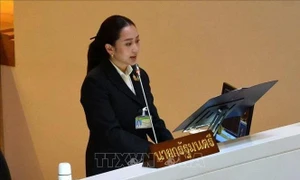
(Channelnewsasia) NEW YORK: New York is the first state in the United States to enact legislation giving people greater powers to repair their electronic devices.
The Digital Fair Repair Act comes into force in July this year, but the issue still remains a contentious one.
As the new law is designed to help customers obtain parts, manuals and diagnostics from manufacturers, many tech firms are worried that this would increase the risk of intellectual property (IP) theft.
‘THROW THEM OUT WHEN THEY BREAK’
Mr Arthur Zilberman, owner and president of Laptop MD, an electronic device repair company which has been in business since 1999, said his is an ailing industry.
Tech manufacturers have made it harder for businesses like his to carry out repairs, he explained.
“Things are designed in a way where you just throw them out when they break and you go buy a new one. This is what manufacturers are looking to do. This is what big companies, big retailers or big tech firms, are looking to do,” he said.
“We cannot get any schematics. For example, if we’d like to call a company (or) a manufacturer and order a simple battery, I can’t do it because they won’t sell it to me. I need to be an authorised repair center.”
But with the new Digital Fair Repair Act which New York Governor Kathy Hochul signed in December, it would soon be easier for consumers in the state to mend their devices.
They will be able to obtain spare parts and manuals to fix their own electronics, or bring them to a local repair shop like Mr Zilberman's, which would be better equipped.
Many are also hoping the increased competition will drive down repair costs.
Repairing a cracked screen or damaged device can cost hundreds of dollars, while sending a device back to the manufacturer can take weeks, and will often be replaced rather than fixed.
However, critics of the new law warn of loopholes in the bill. For example, older devices have been left out.
Ms Gay Gordan-Byrne, executive director of the Digital Right to Repair Coalition, called the legislation “a half-baked law”.
“Consumers will definitely benefit. Anybody that is buying a cellphone or a laptop or tablet is probably going to see that they have a lot more options for repair come July. But the other problem is they started the implementation July 1 for equipment that isn’t built until July 1,” she explained.
Some tech manufacturers also argue that it raises the risk of IP theft and could also jeopardise the quality of repairs.
Technology, operations and statistics professor Vasant Dhar from the NYU Stern School of Business, said: “Now you’re repairing software as opposed to hardware. Well, they should have concerns about their IP (and) they should be concerned that people are just installing rogue operating systems on their devices.”
Lawmakers in California had failed to pass a similar piece of legislation last year, but supporters of New York’s right to repair law now hope that other states will soon follow suit.























